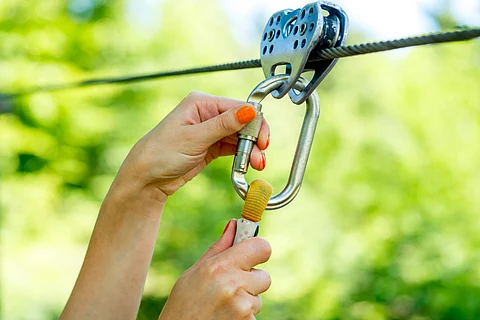
- Destinations
- Experiences
- Stay
- What's new
- Celebrating People
- Responsible Tourism
- CampaignsCampaigns
- SubscribeSubscribe
- Buy Now

The news that a 12-year-old girl suffered severe injuries after she fell from a zipline in Manali on June 8 has kicked off a fierce debate online about the safety of adventure sports in India.
Videos show the zipline cable suddenly breaking mid-way into the ride, causing the child, Trisha, to plummet 30 ft into a rocky gorge below. She sustained multiple fractures in the fall and underwent surgery a few days later. She is now in stable condition and recovering.
This isn’t the first time this year that frightening incidents like this have come to light.
A 28-year-old woman died after falling from a zipline tower at an adventure park in the Bhor tehsil of Pune district on April 18, 2025. The victim, Taral Atpalkar, was preparing to begin her zipline ride at Rajgad Water Park Resort when the tragic incident occurred.
Apparently, she had climbed onto a small iron stool while attempting to attach a safety hook to the zipline railing, but the stool slipped and she lost her footing, plunging 30 ft onto another railing below.
Prior to that in January, three tourists died in separate paragliding crashes in the Kullu and Kangra districts of Himachal Pradesh. In the first incident, a traveller from Tamil Nadu died while the pilot was seriously injured in a mid-air crash of two paragliders in the Garsa Valley.
In the second incident, a 19-year-old girl from Gujarat died after her pilot crashed the paraglider seconds after taking off from the Indrunag paragliding site in Dharamshala. According to a police officer, the accident happened after the pilot lost balance during take-off and fell into a ditch 60 ft below, along with the girl.
In the third incident, a Telangana tourist died in a paragliding crash in Raison village near Manali.
These accidents are just the tip of the iceberg of fatal and injurious accidents involving adventure sports in India.
In 2024, Outlook Traveller examined the legal provisions and challenges inherent in the adventure tourism sector after a 26-year-old Telangana tourist died in February of that year during a misadventure in a paragliding session.
Our report found that a lack of training centres in India, a patchwork of regulations that varies from state to state and the issuance of licenses to unqualified pilots were just some of the problems plaguing the paragliding industry in particular.
After the ziplining accident in Manali, industry experts are sounding the alarm about the prioritisation of profitability over safety, with some going so far as to note that tour operators buy safety equipment from developed countries after it has passed its use-by date.
According to industry estimates, the Indian adventure tourism sector has grown at over 20 per cent annually in recent years. With popular hubs in Himachal Pradesh, Uttarakhand, Ladakh and Goa, a report found that the segment is expected to cross INR 6,000 crore in annual turnover by 2026, driven by increasing urban demand for thrill-based travel experiences.
Outlook Traveller spoke to Vaibhav Kala, the founder and director of Aquaterra Adventures, about whether adventure sports has a bit of a reputation problem in India.
“Adventure activities like ziplining are as safe as the management of these activities, which includes the preparation of the activity in terms of the set up, the equipment, the guides who are managing the activity and the guidelines that they are following,” Kala says. “So, if all these three are set up in a proper manner then they are as safe as anywhere else on the planet.”
He noted that all states have been asked to follow the Adventure Tour Operators Association of India (ATOAI) guidelines for all adventure activities. “These have been communicated from the central government to all states, and these have been encouraged to be followed by registered operators,” he says.
Kala said that people need not stop participating in ziplining and other adventure sports, provided they do their homework first.
“Just ask the right questions, make sure the operator you are going with is careful and has the right equipment, has the right guides, and has the right guidelines to follow,” he says. This extends to verifying the credentials of the operator before signing up, such as the registrations and certifications they have, as well as the history of experience of the guides.
“Customer awareness is very important,” Kala says.
(With inputs from multiple news reports)
